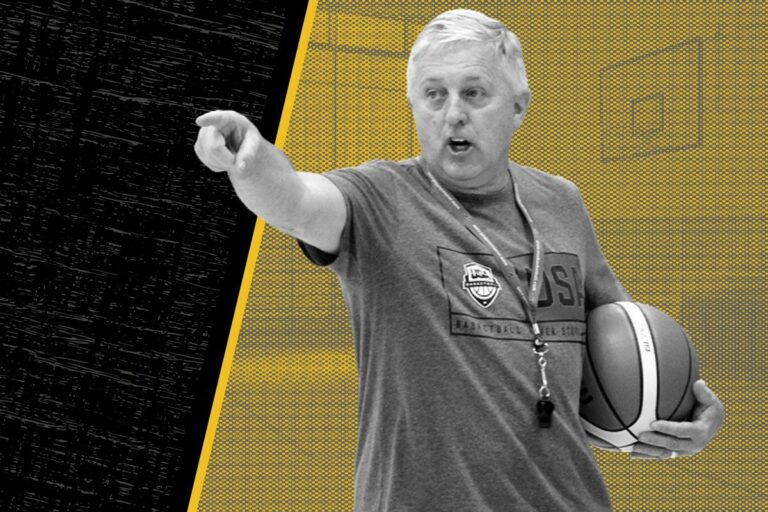The 10 Best TED Talks on Coaching
- Overcoming adversity builds stronger character for student-athletes
- Great coaches can instill lasting values into their athletes, as well as be long-time role models
- A coach has to understand what approach works for their program, and adjust their approach accordingly
The impact of a strong leader is felt by student athletes for a lifetime. However, being a great coach and mentor is no walk in the park; even the greatest coaches need a little motivation from time to time. That’s why we compiled our top 10 favorite TED talks on coaching, for a little wisdom and inspiration.
Learn from some of the greatest youth coaching minds around, and apply their insights as you build your program and become the best leader possible.
HIGHLIGHT: An overly competitive youth sports environment robs kids of valuable learning opportunities. By reevaluating the purpose of youth sports, coaches and parents can incorporate life lessons and reintroduce some plain old fun to the field.
“Change youth sports, change the country.”
The first of our 10 best TED talks for coaches features Jim Thompson, founder and CEO of Positive Coaching Alliance, a national nonprofit dedicated to creating a supportive, character-building sports environment for youth. Since its founding in 1998, PCA has reached 19.2 million kids across the country.
Thompson condemns our current youth sports culture, which he has dubbed the “Entertainment Zone,” for its win-at-all-costs mentality. This entertainment-first sports culture, which pressures athletes to win for the sake of their fan’s entertainment, used to exist mostly in professional arenas. Unfortunately, this culture has infiltrated youth sports, leading to damaging effects on children and missed learning opportunities.
Luckily, Thompson has reimagined youth sports as a “Development Zone,” where every mistake is a learning opportunity and every struggle is embraced. Here, youth athletes get the chance to develop resilience and learn to persevere—skills that truly last a lifetime.
HIGHLIGHT: Athletes can learn to coach themselves through adversity through focusing on the process in the present and building self-confidence.
“I don’t care about the result as long as we have no regrets. We want to make sure we left it all out there and we did.”
Brett Ledbetter, founder of FilmRoomTV.com (a website that gives youth athletes, parents, and coaches access to interviews, advice and lessons from professional coaches and players), has dedicated his professional life to studying what drives winning.
After a year of researching championship coaches, Ledbetter found that all great coaches have one surprising thing in common. Rather than fixating on the end goal, great coaches focus on the process that will help get them there.
Coaches can be the best resource for other coaches, and Ledbetter’s TED talk on coaching is a great example of this. Ledbetter draws on examples from the pros, like former Butler University and current Boston Celtics head coach Brad Stevens. Stevens is exemplary in his ability to maintain emotional discipline through the highs and lows of every game and every season.
Stevens handles difficult moments the same way he handles the easy ones, which gives his athletes the stability to navigate success and adversity alike with confidence and poise.
Inspired by Stevens’s coaching style, Ledbetter devised a set of easy-to-follow instructions to help athletes guide themselves through adversity and towards higher levels of success—or, as Ledbetter puts it, to “build their inner coach.”
HIGHLIGHT: For a team to achieve excellence, the people who make up that team must feel excellent on an individual level. Sometimes motivating a group requires a little creativity and experimentation. Be receptive of what your team responds to and run with it.
“If you guys can play this perfectly for me, I will buy you a pony!”
Band director of 20 years and winner of the Manitoba Band Association Award of Distinction, Cheryl Ferguson says her job is to bring individuals together toward a common goal of musical excellence.
Ferguson shares insights from her long career, including her perspective on why every individual must be nurtured before they can become a contributing member of a group, and how she makes her musicians feel supported on a personal level.
Ferguson’s advice is laced with funny teaching moments that taught her something new about motivating a group towards excellence—like the time she promised a pony to her 6th grade musicians if they could play their piece perfectly.
Spoiler alert: it worked!
Ferguson reassures educators that the tools for excellence are there, but sometimes it takes a little digging and creativity to find them.
HIGHLIGHT: Though kids may ultimately forget the ball-control skills they practiced on the soccer field, they hold onto the life lessons they learned. That’s why, as a coach, your words matter. Use positivity to encourage the development of life skills in your players.
“When you tell a child you believe in them, you light a flame that burns well beyond any game.”
Coach of 26 years and Executive Director of Cincinnati-based STAR Soccer Club, Coach Reed Maltbie (who goes simply by the name “Coach Reed”) knows a thing or two about the value of sports in kids’ lives.
The reality is, he reveals, only 1% of youth athletes continue sports into their adult lives and become professional athletes. The other 99% of us go on to excel at something else.
Even though we leave sports behind, Coach Reed reminds us of the long-lasting impact youth coaches leave on their players.
That’s why, for Coach Reed, it’s not about the technical skills you teach as a coach—it’s about the words you use.
He explains how coaches can use positive words to facilitate the development of life skills in their players, inspiring motivation and encouraging resiliency. These are the skills athletes will carry with them throughout their lives.
HIGHLIGHT: Competition between teammates doesn’t have to be a bad thing. If competition is friendly, teammates can push one another to new heights.
“When would you run faster: by yourself? Or with someone else?”
Ledbetter makes another contribution to the list of best TED talks on coaching—this time on the art of creating healthy competition.
Ledbetter recognizes that some athletes find it difficult to stop comparing themselves to their teammates. This can create friction and rocky relationships within teams.
Thankfully, it doesn’t have to be this way. Instead of as rivals, teammates can view one another as friendly competitors and push each other to levels they could not reach on their own.
As it turns out, Ledbetter explains, everyone—even Kanye West—is motivated by their peers.
HIGHLIGHT: Thinking isn’t about answers, it’s about questions…that lead to more questions. Coaches can help their athletes reach deeper levels of thinking through asking more complex, open-ended questions.
“In cognitive coaching, questions asked by the coach reveal areas of thought that may not be complete or consciously developed.”
With over 15 years of education experience and over a decade as a school administrator, Brian Marshall knows a thing or two about teaching.
As an educator, he realized he was failing his students when he asked questions that only required them to recall information. In other words, when he asked, “who was Louis Armstrong?” he wasn’t asking them to think—he was only asking them to remember a memorized answer.
That’s when Marshall discovered that critical thought isn’t driven by answers, but by questions. His job as a teacher (and as a coach) is to guide his students through their thinking, rather than solve their problems for them.
Marshall developed an approach to questioning that forces his students to reach a deeper level of thought. Through asking open-ended questions that don’t have a straightforward answer, he helps students build self-reflection skills.
HIGHLIGHT: Whether you’re a coach or an athlete, assuming positive intent in tough situations promotes mental strength and rational thinking. Maintaining positivity leads you and your team to more positive outcomes.
“Change the story, change the outcome.”
The title may be a little abrasive, but the message here is anything but.
Bank risk manager-turned-executive Lynn Carnes is a pro when it comes to cultivating leaders, and helping people unlock their full potential.
But she wasn’t always so inspirational. Carnes used to assume the worst, pretty much always, until a random encounter in an airport security line showed her a different way of thinking.
Now, Carnes works to assume positive intent in every situation—and her life has taken a completely different course.
“That’s what I’ve learned about assuming positive intent,” Carnes said. “You’re going to get more of what you touch.”
HIGHLIGHT: Legendary basketball coach John Wooden explains why winning doesn’t equal success; instead, as his Pyramid of Success suggests, genuine success comes from doing our absolute best.
“For who can ask more of a man than giving all within his span?”
You probably know former UCLA head basketball coach John Wooden for his record seven consecutive NCAA DI titles. Or maybe for the four undefeated seasons the Bruins enjoyed under Wooden’s guidance. Perhaps the nickname, the “Wizard of Westwood” rings a bell?
Nicknames, titles, and world records aside, Wooden is widely recognized as one of the greatest coaches of all time.
Despite his many victories on the court (Wooden boasted a 620-147 record with UCLA), Wooden believes that winning does not equate to success.
As a young high school English teacher in Indiana, long before his UCLA days, Wooden created his own definition for success. Over the course of 14 years, he codified this definition as the “Pyramid of Success.”
Conjuring the words of his favorite poets, Wooden captivates his audience with his unparalleled coaching wisdom, and reveals what it truly means to succeed in one of the better TED talks for coaches.
HIGHLIGHT: Anything is possible when you decide to no longer be a spectator to your decision making, but rather an active participant.
“It’s not the decision you make on top of the mountain. It’s the decision you make to get off your couch and put on your hiking clothes.”
Stephen Duneier is many things—founder and CIO of two award-winning hedge funds, seasoned trail-runner, helicopter pilot, large-scale installation artist, and Guinness World Record holder.
What he isn’t, he reveals, is disciplined.
Growing up, Duneier suffered in his academic life because of his self-professed inability to concentrate for more than 10 minutes at a time. Finally, he decided to change his approach to his academic goals.
He learned that by breaking big ideas and big assignments into tiny, manageable tasks, achievements came easily as did the decisions he had to make correctly to get there.
Suddenly, Duneier had the key to unlocking his most ambitious goals and a proven method for tackling the obstacles along the way.
HIGHLIGHT: As a coach, Borton recognized her opportunity to make the world a better place and acted on it, leading her to a fulfilling career. Everyone—especially coaches—leaves behind a legacy. Find inspiration in your opportunity to make a positive impact on your players’ lives and run with it.
“Have you ever wondered what your legacy will be? What mark will you leave on the world?”
Last but absolutely not least on the list of best TED talks for coaches comes from the University of Minnesota’s Pam Borton. As the Golden Gophers’ winningest women’s basketball coach, her record also includes the program’s first appearance in the NCAA’s DI Final Four.
But it was never really about the wins and losses for Borton. She has always been more interested in her opportunity to make an impact in her athletes’ lives.
Through recounting stories of her players—who show up as 18-year-old “knuckleheads” and leave strong, confident, battle-proof women—she makes it clear to coaches that they leave behind a legacy. She urges them to make it a positive one.
For Borton, that legacy is rooted in empowering the young women on her court to become confident leaders in the world, even after the final buzzer of their basketball careers.
She was so inspired by the leadership she saw on her team, she created Empower Leadership Academy and TeamWomenMN, organizations dedicated to helping women and girls develop leadership skills.
For more insightful guides like this one, subscribe to The Edge to get real, first-hand stories about how leaders in different communities build successful programs, delivered straight to your inbox every month.











